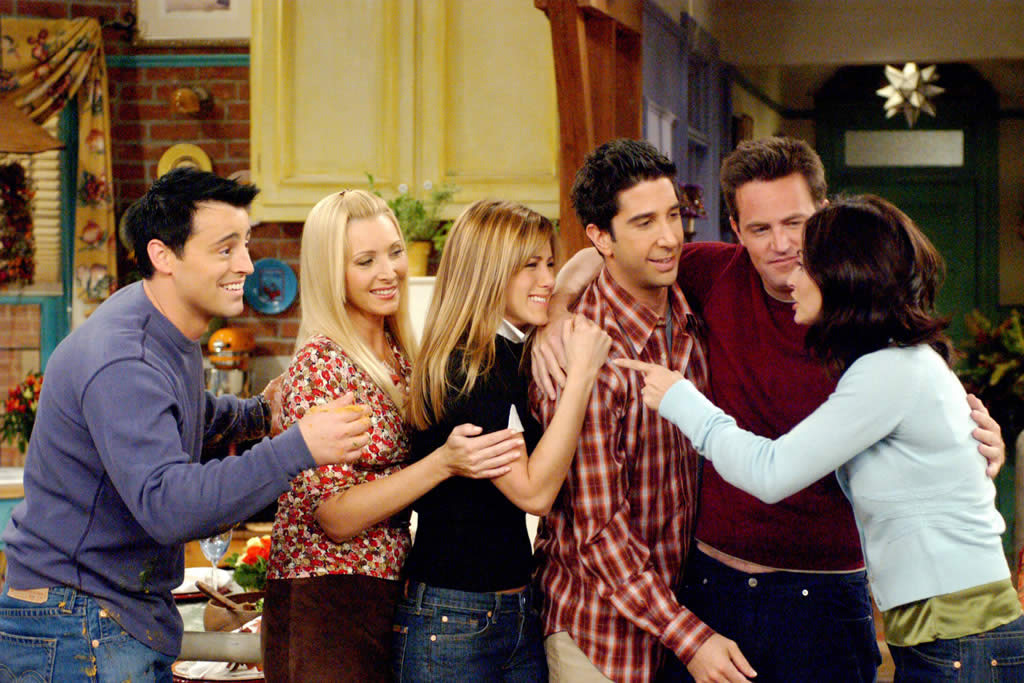
When long-running popular sitcoms come to an end, they generate a lot of discussion about what they mean or, as in the case of How I Met Your Mother, what will happen. But when Friends aired its last episode, a decade ago tonight, there wasn’t; it was just a popular, fun show that ran a lot of years and now wasn’t going to anymore. What else was there to say? It was Friends, for God’s sake!
The reason, I thought, was that there was a bias built into our definition of “important” sitcoms: they had to spur controversies (like All in the Family) or shake up the format and tone of the sitcom form (like Seinfeld). But that’s not the only way TV affects its audience: sometimes, shows are significant precisely because they’re innocuous. They make a statement not about what irritates our society but about what it has, sometimes without entirely noticing, come to accept. So I did a deep dive into the past season DVDs–this was 2004, after all–and wrote an essay for TIME about the show’s open-secret theme: that the “normal” family was a thing of the past, and that a mass audience, as shown by Friends‘ very innocuousness, was fine with that.
The essay, unfortunately, is paywalled. (TIME, fortunately, is glad to sign up you to subscribe so you can read it and everything else in full!) But here’s an excerpt, and the gist:
Being part of Gen X may not mean you had a goatee or were in a grunge band; it did, however, mean there was a good chance that your family was screwed up and that you feared it had damaged you. … For 10 years, through all the musical-chairs dating and goofy college-flashback episodes, the characters have dealt with one problem: how to replace the kind of family in which they grew up with the one they believed they were supposed to have. One way was by making one another family. But they also found answers that should have, yet somehow didn’t, set off conniptions in the people now exercised over gay marriage and Janet Jackson’s nipple.
There was, of course, all the sleeping around, though that’s not exactly rare on TV today. More unusual was Friends‘ fixation–consistent but never spotlighted in “very special episodes”–with alternative families. Like all romantic comedies, Friends tends to end its seasons with weddings or births. And yet none of the Friends has had a baby the “normal” way–in the Bushian sense–through procreative sex between a legally sanctioned husband and wife. Chandler and Monica adopt. Ross has kids by his lesbian ex-wife and his unwed ex-girlfriend. Phoebe carries her half brother and his wife’s triplets (one of the funniest, sweetest and creepiest situations ever–“My sister’s gonna have my baby!” he whoops). As paleontologist Ross might put it, Friends is, on a Darwinian level, about how the species adapts to propagate itself when the old nuclear-family methods don’t work.
It’s not as if Friends changed society single-handed, or that society has changed that completely at all. Even if audiences were unfazed by Friends‘ gay wedding (performed by Candace Gingrich!), gay marriage is still becoming legal only state by state. But it’s certainly true that Friends‘ running theme of untraditional, improvisatory families is now part of the standard language of sitcoms like Modern Family (in which Cam and Mitchell are readying to get hitched) and Trophy Wife. Transgender characters are more common, as on Orange Is the New Black, and given a more subtle portrayal than Chandler’s Vegas-drag-queen father. (Friends wasn’t that perfectly enlightened, the major case in point being its almost entirely white universe of characters.)
A decade after Friends, in other words, complicated is now normal. Maybe Friends didn’t proselytize for these changes, and it never sought credit for them. Today, if you watch the reruns, you probably think of the show, if anything, as The One Where They Drank Coffee and Dated Each Other in Various Combinations. You probably don’t think about the importance of Friends at all. And that means it did its job.
More Must-Reads From TIME
- The 100 Most Influential People of 2024
- Coco Gauff Is Playing for Herself Now
- Scenes From Pro-Palestinian Encampments Across U.S. Universities
- 6 Compliments That Land Every Time
- If You're Dating Right Now , You're Brave: Column
- The AI That Could Heal a Divided Internet
- Fallout Is a Brilliant Model for the Future of Video Game Adaptations
- Want Weekly Recs on What to Watch, Read, and More? Sign Up for Worth Your Time
Contact us at letters@time.com